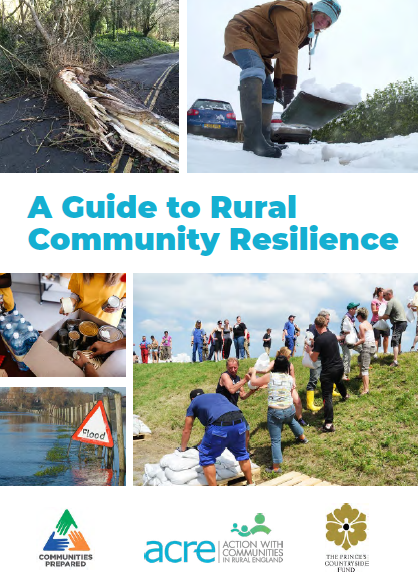From floods to pandemics – resilience for rural communities at times of crisis
Communities Prepared (a Groundwork South programme) and Action with Communities in Rural England (ACRE) have published a new guide to help rural communities become more resilient in the face of emergencies.
Drawing on the experience of local rural charities and existing initiatives, the guide provides practical tips for rural residents to prepare for, and help each other, at times of crisis. It shows how volunteer groups can be set up to develop emergency plans that identify local risks, and maps out the resources and support which can be mobilised should situations arise that threaten the health, wellbeing and livelihoods of people in the local area.
Financial backing for the guide has been primarily provided by The Prince’s Countryside Fund, with additional support from The National Lottery Community Fund.
Zoey Ayling, Programme Manager for Communities Prepared said: “As the outbreak of Covid-19 has demonstrated, unexpected events can and do happen, threatening the way of life we have become accustomed to. Sometimes the impact on individuals and the services that support them can be severe, with recovery taking months, if not years. That’s why we created this guide to help communities plan ahead, offering information and practical guidance on how to identify risk, understand the key roles during an emergency and pull together to build long term resilience.”

The guide features stories where rural communities took a proactive approach to anticipating and responding to emergency situations. These include the delivery of hot meals to residents in Caddington, Bedfordshire, who were left without electricity and gas after heavy snowfall, and community and voluntary organisations that joined together to help residents and businesses recover following the extensive flood damage caused by Storm Desmond in 2015.
David Emerson, ACRE’s Chair said: “We are delighted to publish this guidance with Communities Prepared which builds on the ACRE Network’s rich heritage of helping rural communities to help themselves – sometimes at the most difficult of times – by making the most of their local knowledge, capacity and resources. In contrast to their urban counterparts, rural communities are not well served by public infrastructure and services so initiatives led by volunteers can make a tremendous difference to the wellbeing, livelihoods and security of everyone locally. This way of working has been demonstrated brilliantly in the context of Coronavirus – when we are seeing rural communities across England taking a lead on local responses to the pandemic, from good neighbour schemes to village halls being used to distribute food parcels”.
Building community resilience to challenges also has many other benefits. Examples in the guide show how this can also bring about environmental improvements, foster new community networks, and underpin social cohesion.
This essential guide will make it possible for everyone in the countryside to recognise the risks to their community, understand what can be done to prepare for them, and be familiar with the emergency actions that can be taken in conjunction with other agencies should the worst happen.
In contrast to their urban counterparts, rural communities are not well served by public infrastructure and services so initiatives led by volunteers can make a tremendous difference to the wellbeing, livelihoods and security of everyone locally



